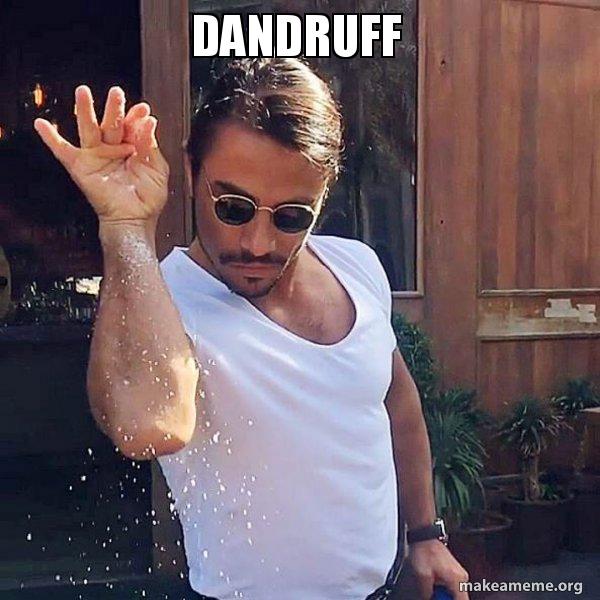

· By Customer Team
Is That Dandruff or Dry Scalp? (Yes, There’s a Difference)
If you look in the mirror and find white flakes on your shirt, the first thought that comes to mind might be: dandruff. Not so fast. Before you consult Dr. Google about the snowdrift coming off your scalp, it’s important to find out whether you actually have dandruff or just a dry scalp.
Dandruff and dry scalp share some of the same symptoms, like itching, flaking, and (most of all) embarrassment. However, these are two different conditions that require different treatment options.
In this article, we’ll explain the differences between dandruff and dry scalp so you can eradicate your flakes for good. As Sun Tzu said, you can’t beat your enemy if you don’t know your enemy.
Dandruff vs. Dry Scalp: What’s the Difference?
The main difference between dandruff and dry scalp is usually the amount of moisture and natural oil you have on your head.
As the name implies, dry scalp happens when the skin on your head isn’t producing or retaining enough moisture. Specifically, you’re running low on sebum: the oily substance produced by your sebaceous glands.
Your scalp can lack hydration because of your climate, genetics, hair care products, or a combination. Here are some common causes:
- Over-washing your hair (especially with harsh shampoos that contain sulfates)
- Excessive heat—whether from the sun, blowdryer, or a scalding hot shower)
- Stress
- Skin conditions, primarily eczema
- Genetics—some people are just wired to have dry skin
Like other forms of dry skin, you can experience itchiness, irritation, and tightness. Your hair can also be dry and brittle since the hair follicles aren’t getting enough oil.
If the dryness is severe, you might notice small, white, dry flakes. But if your flakes are big, oily, and scaly, you’re probably dealing with dandruff.
Dandruff is a common medical condition that causes your scalp to shed clumps of dead skin cells that look like oily flakes. Researchers aren’t exactly sure what causes dandruff, according to the American Academy of Dermatology. However, there are two main theories.
Dandruff is often attributed to an overgrowth of a yeast/fungus called Malassezia, which feeds on scalp oil. That might sound gross, but this stuff lives on virtually everyone’s head. For reasons unknown, some people produce too much of it. When that happens, the skin cells that would typically slough off bind together and form large, oily flakes that appear yellow or beige.
Dandruff can also be a mild form of seborrheic dermatitis, a skin condition that causes a red, itchy rash and a flaky scalp. Seborrheic dermatitis can flare up with stress or a cold, dry climate.
There’s a stigma that people with dandruff are “dirty,” but the reality is that anybody can get it, even if your hair care routine is on point. In fact, up to half of adults worldwide experience dandruff, and it’s more common with males, according to Mayo Clinic.
Bottom line: the easiest way to know whether you have dandruff or a dry scalp is to look at the flakes. Dry scalp flakes are small, white flecks while dandruff flakes are bigger, scaly, and oily.
How to Treat Dandruff
A lot of people use anti-dandruff shampoo to scrub away the buildup of oil and fungus on their scalp. But here’s the catch: shampooing frequently can dry you out. So you end up trading one problem (dandruff) for another (dry, brittle, poofy hair).
That’s where Modern Mammals' Magic Mud Shampoo comes in: a shampoo alternative preserves your hair’s natural moisture while also rebalancing your scalp’s microbiome—because you shouldn’t have to choose between scalp health and amazing hair.
For severe cases of dandruff, you might need to see a dermatologist. They might prescribe an anti-fungal shampoo that contains salicylic acid, coal tar, or ketoconazole to slow the buildup of dead skin cells on the scalp.
How to Treat Dry Scalp
The main reason guys get a dry scalp is that they over-wash their hair. Too much shampoo sends your natural oils down the drain.
If your hair is always grimy and you desperately need to wash it, Modern Mammals has your back—or your head, rather. Unlike shampoos and conditioners (or worse, 2-in-1) our formula is free of sulfates and parabens so you can wash your hair as often as you need without worrying about flakes.
For guys who live in a super-dry climate, running a humidifier can help your skin retain hydration. Speaking of which, make sure you’re drinking enough water (about 15 cups daily). Your skin will thank you.
Put Flake Fears Behind You
Dandruff and dry scalp are common, but that doesn’t mean you can’t take matters into your own hands (literally). Just like the food you eat affects how you feel, the products you put on your head affect your hair and scalp.
Say goodbye to shampoo so you can say goodbye to your flaky, itchy scalp.
